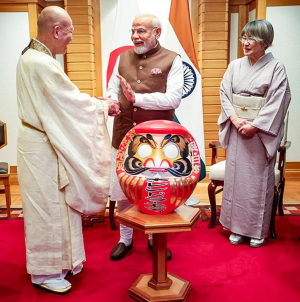 Delhi : Delhi : New Delhi | August 29, 2025
In a symbolic moment that beautifully highlighted the spiritual and cultural bonds between India and Japan, Prime Minister Narendra Modi was presented with a Daruma doll, one of Japan’s most iconic cultural artifacts. The ceremony took place at the historic Shorinzan Daruma-Ji Temple in Kitakatsuragi, Japan, where the sacred gift was handed over by Rev. Seishi Hirose, the chief priest of the temple.
This simple yet profound gesture captured the essence of centuries-old ties—rooted in the journey of Buddhism from India to Japan—and underlined how traditions continue to serve as bridges between nations.
The Daruma Doll: A Symbol of Resilience
The Daruma doll is among the most recognizable artifacts of Japanese tradition. With its round, hollow design and characteristic red color, it is a familiar sight in homes, offices, and temples across Japan.
The doll embodies the spirit of the Japanese proverb “Nana korobi ya oki”, meaning “Fall seven times, get up eight.” It represents determination, perseverance, and the power to rise again after setbacks—values deeply respected both in spirituality and everyday life.
Daruma dolls are weighted at the bottom, allowing them to return upright even after being knocked down. This physical design beautifully mirrors the human ability to recover from challenges, making the doll not only a decorative item but also a philosophy of resilience.
The Indian Connection: Bodhidharma’s Journey
Though now a quintessential Japanese symbol, the story of the Daruma doll begins in ancient India with a monk named Bodhidharma.
Historical accounts suggest Bodhidharma traveled from India (or possibly Persia) to China, where he became a central figure in spreading Zen Buddhism. From China, his teachings made their way to Japan, shaping spiritual traditions and art.
Known in Japan as Daruma, Bodhidharma became legendary for his devotion to meditation. According to tradition, he spent nine years meditating facing a wall at China’s Shaolin Temple. His intense discipline was so extreme that his legs are said to have atrophied, which inspired the Daruma doll’s armless and legless form.
Thus, every Daruma doll represents not just Japanese determination, but also the Indian origins of Zen philosophy, making Modi’s gift especially symbolic.
A Spiritual Artifact in a Modern World
Over centuries, the Daruma doll has transcended its spiritual beginnings to become a part of everyday Japanese life. No longer confined to temples, it is now embraced in politics, education, business, and even personal milestones.
The dolls are crafted in various colors, each carrying its own meaning:
Red: Good fortune and prosperity
White: Love and harmony
Gold: Wealth and success
Green: Health and vitality
From politicians marking the start of campaigns to students preparing for exams, the Daruma is seen as a companion in pursuing goals. One common practice is to paint one of the doll’s eyes while setting a goal; the second eye is added once the goal is achieved—turning the doll into a personal witness of resilience and accomplishment.
India and Japan: Shared Spiritual Heritage
Prime Minister Modi’s acceptance of the Daruma doll was more than a diplomatic gesture—it was a symbolic recognition of India’s role as the birthplace of Buddhism and its lasting influence on Asian spirituality.
For Japan, presenting the Daruma was a way of honoring the shared roots of Zen and acknowledging the cultural continuum that binds the two nations.
As Modi stood at the Shorinzan Daruma-Ji Temple, receiving the sacred artifact, the moment reflected a 1,500-year-old cultural journey—from Bodhidharma’s meditations in India to Japan’s embrace of the Daruma as a national symbol.
A Bridge Across Time and Traditions
In today’s globalized world, cultural artifacts like the Daruma doll serve as reminders of our interconnected histories. For India and Japan, this exchange is not just about heritage, but also about forging a modern partnership strengthened by shared values of resilience, perseverance, and spirituality.
By receiving the Daruma doll, Prime Minister Modi symbolically reconnected India with its ancient spiritual emissary—Bodhidharma—whose legacy continues to inspire millions in Japan.
As traditions evolve, gestures like these prove that cultural diplomacy is as powerful as any economic or political agreement—building bridges that withstand the test of time. |